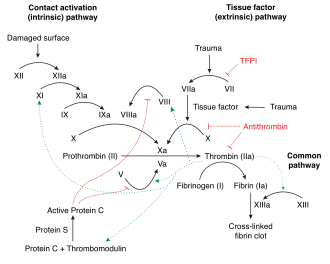Haemophilia B

Editor-In-Chief: Prab R Tumpati, MD
Obesity, Sleep & Internal medicine
Founder, WikiMD Wellnesspedia &
W8MD's medical weight loss NYC, sleep center NYC
Philadelphia medical weight loss and Philadelphia sleep clinics
| Haemophilia B | |
|---|---|

| |
| Synonyms | Christmas disease, Factor IX deficiency |
| Pronounce | |
| Specialty | Hematology |
| Symptoms | Prolonged bleeding, easy bruising, joint pain |
| Complications | Hemarthrosis, intracranial hemorrhage, anemia |
| Onset | Childhood |
| Duration | Lifelong |
| Types | |
| Causes | Genetic mutation in the F9 gene |
| Risks | Family history |
| Diagnosis | Blood test for Factor IX activity |
| Differential diagnosis | Haemophilia A, von Willebrand disease |
| Prevention | Genetic counseling |
| Treatment | Factor IX replacement therapy, desmopressin |
| Medication | |
| Prognosis | Normal life expectancy with treatment |
| Frequency | 1 in 25,000 male births |
| Deaths | |



Haemophilia B is a blood disorder that prevents blood from clotting properly. This is a rare genetic disorder that is usually inherited. It is caused by a deficiency of Factor IX, a clotting protein.
Symptoms[edit]
The symptoms of Haemophilia B can vary greatly, depending on the severity of the disorder. Some of the most common symptoms include:
- Bleeding that is difficult to stop, even from minor wounds
- Frequent and unexplained nosebleeds
- Blood in the urine or stool
- Unusual bruising
- Joint pain and swelling
Causes[edit]
Haemophilia B is caused by a mutation in the F9 gene, which is responsible for producing Factor IX. This mutation can be inherited from a parent, or it can occur spontaneously.
Diagnosis[edit]
Diagnosis of Haemophilia B is usually made through a blood test that measures the level of Factor IX in the blood. Other tests may be used to rule out other conditions that can cause similar symptoms.
Treatment[edit]
Treatment for Haemophilia B typically involves replacing the missing Factor IX through infusions of a clotting factor concentrate. Other treatments may include medications to prevent blood clots, and physical therapy to manage joint damage.
See also[edit]
References[edit]
<references />
Ad. Transform your life with W8MD's Budget GLP-1 injections from $49.99


W8MD offers a medical weight loss program to lose weight in Philadelphia. Our physician-supervised medical weight loss provides:
- Weight loss injections in NYC (generic and brand names):
- Zepbound / Mounjaro, Wegovy / Ozempic, Saxenda
- Most insurances accepted or discounted self-pay rates. We will obtain insurance prior authorizations if needed.
- Generic GLP1 weight loss injections from $49.99 for the starting dose of Semaglutide and $65.00 for Tirzepatide.
- Also offer prescription weight loss medications including Phentermine, Qsymia, Diethylpropion, Contrave etc.
NYC weight loss doctor appointmentsNYC weight loss doctor appointments
Start your NYC weight loss journey today at our NYC medical weight loss and Philadelphia medical weight loss clinics.
- Call 718-946-5500 to lose weight in NYC or for medical weight loss in Philadelphia 215-676-2334.
- Tags:NYC medical weight loss, Philadelphia lose weight Zepbound NYC, Budget GLP1 weight loss injections, Wegovy Philadelphia, Wegovy NYC, Philadelphia medical weight loss, Brookly weight loss and Wegovy NYC
|
WikiMD's Wellness Encyclopedia |
| Let Food Be Thy Medicine Medicine Thy Food - Hippocrates |
Medical Disclaimer: WikiMD is not a substitute for professional medical advice. The information on WikiMD is provided as an information resource only, may be incorrect, outdated or misleading, and is not to be used or relied on for any diagnostic or treatment purposes. Please consult your health care provider before making any healthcare decisions or for guidance about a specific medical condition. WikiMD expressly disclaims responsibility, and shall have no liability, for any damages, loss, injury, or liability whatsoever suffered as a result of your reliance on the information contained in this site. By visiting this site you agree to the foregoing terms and conditions, which may from time to time be changed or supplemented by WikiMD. If you do not agree to the foregoing terms and conditions, you should not enter or use this site. See full disclaimer.
Credits:Most images are courtesy of Wikimedia commons, and templates, categories Wikipedia, licensed under CC BY SA or similar.
Translate this page: - East Asian
中文,
日本,
한국어,
South Asian
हिन्दी,
தமிழ்,
తెలుగు,
Urdu,
ಕನ್ನಡ,
Southeast Asian
Indonesian,
Vietnamese,
Thai,
မြန်မာဘာသာ,
বাংলা
European
español,
Deutsch,
français,
Greek,
português do Brasil,
polski,
română,
русский,
Nederlands,
norsk,
svenska,
suomi,
Italian
Middle Eastern & African
عربى,
Turkish,
Persian,
Hebrew,
Afrikaans,
isiZulu,
Kiswahili,
Other
Bulgarian,
Hungarian,
Czech,
Swedish,
മലയാളം,
मराठी,
ਪੰਜਾਬੀ,
ગુજરાતી,
Portuguese,
Ukrainian


